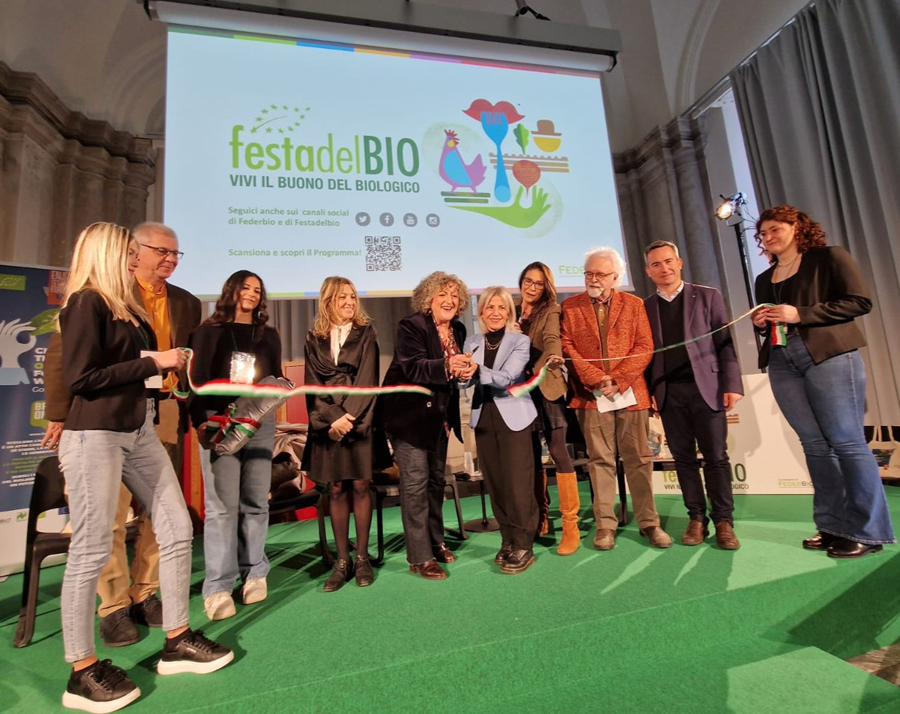Promoted as part of the Being Organic in EU project, managed by FederBio in collaboration with Naturland and co-financed by the European Union, the benchmark event for Italian organic products highlighted the importance of conscious food choices for the health of people and natural habitats.
The thematic talks, workshops, showcooking and the contest “GOOD. IT’S ORGANIC!” aroused great interest.
Food choices play a crucial role in people’s health, the protection of environmental ecosystems and the mitigation of climate change. This is the message launched by the Milanese stage of the seventh edition of the Festa del BIO, which underlined the value of organic as a key element in building a sustainable future; a virtuous model, essential for preserving natural resources for the benefit of future generations.
During the day of discussion between experts, researchers, nutritionists and farmers on the future of agriculture and food, the fundamental role of the agroecological transition, of which organic and biodynamic represent the peaks of excellence, clearly emerged. At the Festa del BIO, the importance of food education was underlined to promote more conscious choices, encouraging the consumption of local foods, the reduction of meat and the fight against food waste.
“The rapid evolution of the climate crisis confirms the need and urgency of a radical change in the agricultural model and food choices – highlighted Maria Grazia Mammuccini, President of FederBio – According to the data recently presented by Nomisma, many of our country’s productions have suffered production drops that in several cases exceed 30%, especially in the center and south, due to the climate crisis. We no longer have time. To protect our agricultural productions, we must act immediately and accelerate the transition to agroecology to achieve the objectives of the Green Deal even more quickly, which aim to reach 25% of organic cultivated surface area in the EU by 2030. To change the production model, however, it is essential to also change the way we consume, which is why we believe it is essential to raise awareness among citizens and make them understand that when we choose a food we also choose the method with which it is grown. There is a collective responsibility that concerns on the one hand farmers, who must act more and more towards sustainability also through conversion to organic, on the other citizens, who must make conscious choices towards food produced in respect of Nature and people’s health. Aiming for the lowest price involves a compromise of workers’ rights, the reduction of farmers’ income, effectively opening up to undeclared work. Environmental sustainability is not in conflict with economic and social sustainability, on the contrary everything is part of a coherent and integrated process”.
“The introduction of food education in schools is fundamental for us,” said Barbara Nappini, President of Slow Food Italy. “I often compare our food system to a plate with an invisible “beam” inside it. This metaphor represents an unjust paradigm that combines environmental degradation, waste and hunger, contributing to increasing the gap between the North and the South of the world. It is urgent to change the model and recognize the value of agriculture integrated with ecosystems: for us the way forward is organic and agroecology. To build a more equitable and sustainable future, it is extremely important to raise awareness among new generations about the link between food, the environment and social justice. According to the ISMEA report, out of 100 euros spent on fresh products, only 7 end up with the farmer, while for processed products this figure drops to 1.5 euros. This data highlights a deep crisis, but at the same time offers an opportunity: to think of a new production model, because the intensive one is now at the end of the line. The problem is global, but it can be addressed through the three pillars of economic, social and environmental sustainability, and with good, clean and fair agronomic approaches such as organic”.
“In our annual report “Stop pesticides on the plate” – added Stefano Ciafani , President of Legambiente – it clearly emerges how too many samples of conventional fruit and vegetables continue to present more pesticide residues and we denounce the lack of legislation to set legal limits on the co-presence of multiple active ingredients, an essential measure to guarantee greater food safety and health protection. Italy, which is among the international leaders in the organic sector, must protect this heritage and its rigorous and more transparent standard compared to those of various international productions, which in some ways create unfair competition for Italian products. Together with FederBio and Slow Food Italia we work to promote clear, transparent and informed information on these issues, also countering the ideological propaganda that attempts to discredit the Green Deal and its decarbonization actions, of which the main beneficiaries are precisely the farmers who are among the first victims of the climate crisis”.
“In Italy, the agricultural surfaces dedicated to organic are growing, supported by policies that encourage the agroecological transition, with more evident results in small and medium-sized companies – underlined Nicoletta Maffini , President of AssoBio – However, in large companies, located especially in Piedmont, Lombardy and Veneto, organic farming is not yet sufficiently widespread. However, the main point concerns consumption: in our country there is still a skepticism linked to controls, which makes clearer and more effective communication on the benefits of organic essential. Organic farming represents a concrete response that respects and regenerates the land, harshly exploited in previous decades by intensive agriculture, which has caused serious environmental damage. Today, with climate change increasingly putting the agricultural sector in crisis, organic is confirmed as the indispensable choice for the future. However, it is essential to review VAT, a product that protects health and the environment, such as organic, deserves a tax break. Everyone’s commitment is needed to achieve this goal”.

